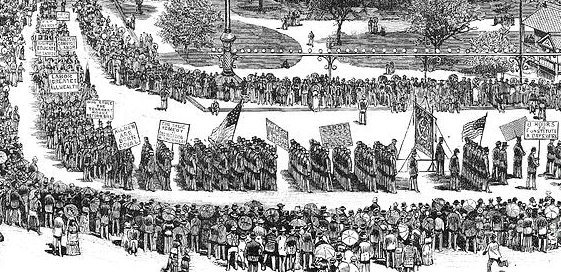Avodah, work

Leshon Ima – Mother Tongue with Dr. Rachel Zohar Dulin, The Dayton Jewish Observer
For some of us the month of May conjures an association with labor’s struggle for workers’ rights. On the Hebrew calendar, summer comes to mind. This year, we celebrate Shavuot at the end of May. Shavuot is a biblical agricultural holiday that marked the end of spring. Farmers and their families celebrated with joy the fruits of their labor, bringing the first produce of their fields as gifts to God, expressing gratitude (Deut 16: 9-12).
Only later in our history did Shavuot become the holiday to mark matan Torah, the receiving of the Torah.
In Europe, also, May marks the beginning of summer. Sending flowers and burning bonfires were part of the Northern Hemisphere’s rites of May Day. These celebrations did not enter American lore due to Puritan rejection of pagan customs.

But it was on May Day that the American labor unions made their mark worldwide. Events in Chicago, from demonstrations on Michigan Avenue on May 1, 1886 to the Haymarket Square riot gave impetus to the workers’ unions worldwide to fight for civil rights, including an eight-hour work day and better child labor laws.
In 1894, President Grover Cleveland signed the bill recognizing the achievements of the labor movement.
However, Labor Day in America was set for September in order not to give credit to labor organizers who were perceived to be foreign, social anarchists.
Let us look at the Hebrew word for work, avodah, in honor of Shavuot, Israel’s farmers’ holiday, and the achievements of the labor unions.
Avodah means work, labor, employment, occupation, profession, creative work, service and worship. Avodah is derived from the verb avad meaning work, serve, perform and worship. It is mentioned 145 times in the Bible, in terms of physical or harsh labor (Lev. 23:7; Ex. 1:14) and in reference to observance of the Law (Ex. 12:25) and worship (Num. 7:5).
In post-biblical Hebrew, avodah also meant cultivate, tan (hides), as well as the names of portions of the liturgy. In modern Hebrew, avodah received added meanings such as life’s work, creative enterprise and a project.
Avodah is at the center of many Hebrew phrases. Avodat adamah means cultivation of the soil. Avodat yad means handmade, and avodat kapayim means manual labor (kapayim means palms of hands).
Avodat nemalim (work of ants) implies industrious labor, and avodat perech means hard labor (perech means oppressive). Avodat kodesh means worship (kodesh means holy) and avodah zara refers to idolatry (zara means foreign).
We will end on a political note. The Israeli Zionist Union Party (Hamachaneh Hatziyoni) is a merger of parties, Avodah (Labor) being the largest. The name of the new political camp indicates that the idea of avodah is no longer at the center of the newly formed party’s agenda. Does it represent a shift in Israel’s political culture? Time will tell.
I wish all our readers a happy Shavuot, a holiday in which Torah and avodah juxtapose.
Dr. Rachel Zohar Dulin is a professor of biblical literature at Spertus College in Chicago and an adjunct professor of Bible and Hebrew at New College of Florida.
To read the complete May 2015 Dayton Jewish Observer, click here.





